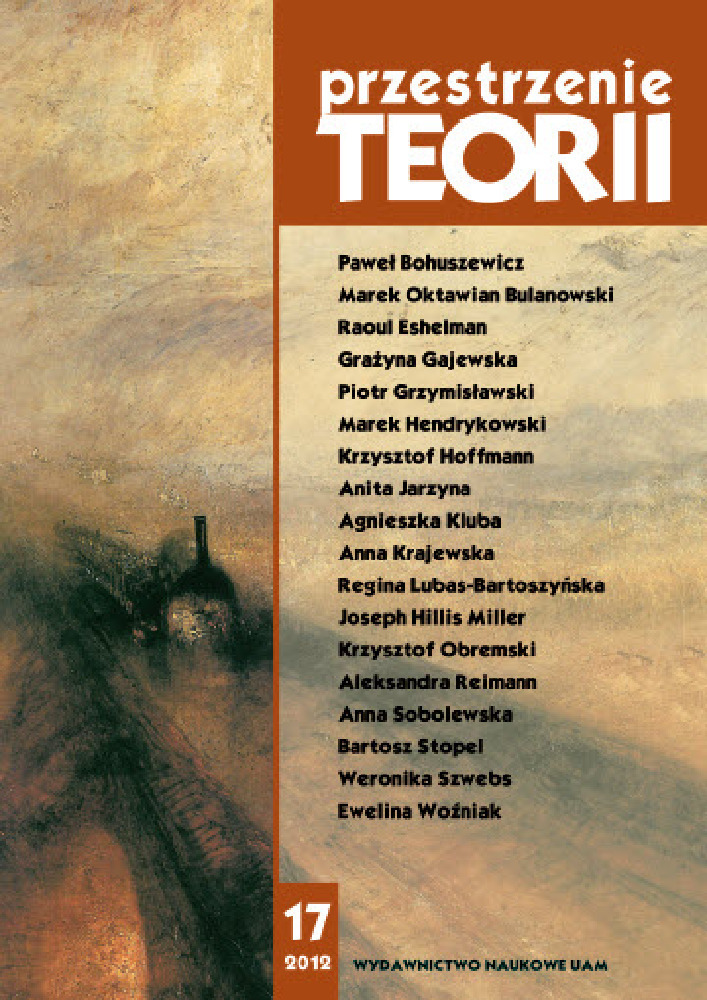Abstrakt
The article deals with a New Understanding of nature and culture, which is being crystallized in the intellectual current defined by the name of post-humanities. The starting point for the analysis of work of art from the area of bioart – transgenic plant named Edunia, which is a part of a larger project Natural History of the Enigma. Edunia, which does not occur in nature but was created by the artist Eduardo Kac by means of specialists in the field of genetic engineering. A new form of life defined as plantimal shows a DNA expression of the artist included into decorative flowers of petunia. Rose petals of flowers are “interspersed” by dark red vessels the feature of which is the expression of Kac’s gene; this because the artist took care of that that his DNA was found just in the venation of the flower. In the article I present two interpretation paths of this work of bioart which, however, are not a sharp counterpoint to one another, but somewhat differently place accents between nature and culture in their mutual entanglements. One of these paths may be defined as an attempt at making others realise or reminding them about our evolutional species condition, while the other one as an attempt at treating nature as an important actor of the sociopolitical activities.Bibliografia
M. Bakke, Postnaturalna historia Edunii, „Kultura Współczesna” 2011, nr 1, s. 123.
M. Bakke, Bio-transfiguracje. Sztuka i estetyka posthumanizmu, Poznań 2011, s. 171-174.
Księga Rodzaju, 1, 26 w: Pismo Święte: Stary i Nowy Testament: w przekładzie z języków oryginalnych, oprac. zespół pod red. M. Petera (Stary Testament), M. Wolniewicza (Nowy Testament), wyd. 1, Poznań 2006, s. 27 oraz 1, 28, s. 27
M. Buber, Problem człowieka, przeł. R. Reszke, Warszawa 1993, s. 9-17.
Arystoteles, Polityka, w: Polityka z dodatkiem pseudo-arystotelesowej Ekonomiki, przeł. L. Piotrowicz, wstęp K. Grzybowski, Warszawa 1964, s. 6-7.
Św. Augustyn, Wyznania, przeł. J. Czuj, Warszawa 1953, s. 319-320.
B. Pascal, Myśli, przeł. T. Boy-Żeleński, Warszawa 1958, s. 63, 144.
J.G. Herder, Rozprawa o pochodzeniu języka, przeł. B. Płaczkowska, w: tenże, Wybór pism, wybór i oprac. T. Naumowicz, Wrocław–Warszawa 1988, s. 87.
S. Freud, Wstęp do psychoanalizy, przeł. S. Kempnerówna, W. Zaniewicki, przedmowa K. Obuchowski, L. Korzeniowski, Warszawa 1995, s. 54-56.
E. Mounier, Wprowadzenie do egzystencjalizmów oraz wybór innych prac, wybór i oprac. J. Zabłocki, Kraków 1965, s. 8, 9.
E. Lévinas, Całość i nieskończoność. Esej o zewnętrzności, przeł. M. Kowalska, Warszawa 1998, s. 26.
L. Margulis, Symbiotyczna planeta, przeł. M. Ryszkiewicz, Warszawa 2000.
P. Macnaghten, J. Urry, Alternatywne przyrody: nowe myślenie o przyrodzie i społeczeństwie, przeł. B. Baran, Warszawa 2005, s. 9.
B. Latour, Polityka natury: nauki wkraczają do demokracji, przeł. A. Czarnacka, wstęp M. Gdula, Warszawa 2009
raport Rady Unii Europejskiej z 14-16 grudnia 2009 roku: <http://www.consilium. europa.eu/uedocs/cms_data/docs/pressdata/en/agricult/111950.pdf> [16.07.2011].
<http://www3.mpch-mainz.mpg.de/~air/anthropocene/Text.html> [25.07.2011].
L. Digby, The cytology of Primula kewensis and of other related Primula hybrids, 1912, Ann. Bot. 26: 357-388.
K. Darwin, O powstawaniu gatunków drogą doboru naturalnego czyli o utrzymywaniu się doskonalszych ras w walce o byt, na podstawie przekł. S. Dicksteina i J. Nusbauma, przedm. J. Weiner, Warszawa 2009, s. 10-11, 229-261.
M. Popczyk, Przemyśleć przyrodę, „Kultura Współczesna” 2011, nr 1, s. 22.
G. Vico, Nauka nowa, oprac. i wstęp S. Krzemień-Ojak, przeł. J. Jakubowicz, Warszawa 1966.
H. Arendt, Między czasem minionym a przyszłym: osiem ćwiczeń z myśli politycznej, Warszawa 1994, s. 326.
W. Heisenberg, Ponad granicami, Warszawa 1979.
Licencja
Autorzy
Autorzy tekstów przyjętych do publikacji w czasopiśmie „Przestrzeniach Teorii” są zobowiązani do wypełnienia, podpisania i odesłania na adres redakcji umowy o udzielenie nieodpłatnej licencji do utworów, z zobowiązaniem do udzielania sublicencji CC.
Zgodnie z umową, autorzy tekstów opublikowanych w czasopiśmie „Przestrzeniach Teorii” udzielają Uniwersytetowi im. Adama Mickiewicza w Poznaniu niewyłącznej i nieodpłatnej licencji oraz zezwalą na użycie sublicencji Creative Commons Attribution-NonCommercial-NoDerivatives 4.0 International (CC BY-NC-ND 4.0).
Autorzy zachowują prawa do dalszego, swobodnego rozporządzania utworem.
Autorzy, którzy wykorzystują w swoim tekście cudze utwory (np. ilustracje, fotografie) proszeni są o dostarczenie do redakcji czasopisma zgodę na publikację od uprawnionych podmiotów.
Użytkownicy
Zainteresowani użytkownicy internetu uprawnieni są do korzystania z utworów opublikowanych po 2015 roku „Przestrzeniach Teorii” tylko w calach niekomercyjnych, pod następującymi warunkami:
- uznanie autorstwa - obowiązek podania wraz z rozpowszechnionym utworem, informacji, o autorstwie, tytule, źródle (odnośniki do oryginalnego utworu, DOI) oraz samej licencji;
- bez tworzenia utworów zależnych - utwór musi być zachowany w oryginalnej postaci, nie można bez zgody twórcy rozpowszechniać np. tłumaczeń, opracowań.
Do wszystkich tekstów opublikowanych przed 2015 r. prawa autorskie są zastrzeżone.
Inne
Uniwersytet im. Adama Mickiewicza w Poznaniu zachowuje prawo do czasopisma jako całości (układ, forma graficzna, tytuł, projekt okładki, logo itp.).
